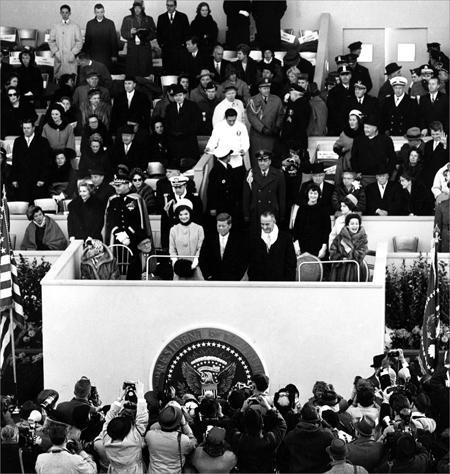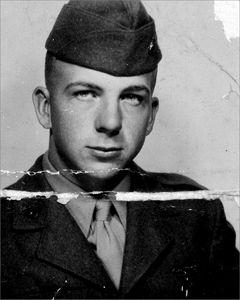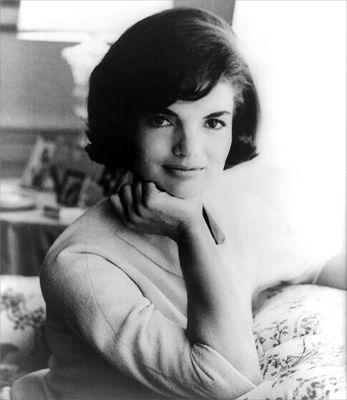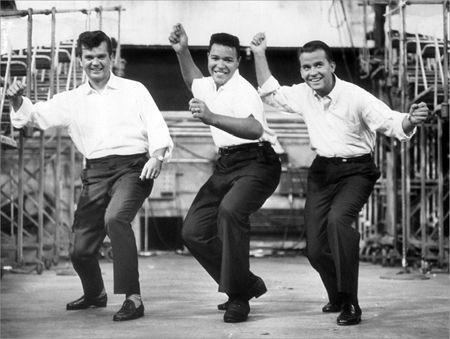Kennedy's Last Days: The Assassination That Defined a Generation (6 page)
Read Kennedy's Last Days: The Assassination That Defined a Generation Online
Authors: Bill O'Reilly

“… So help you, God.”
“… So help me, God.”
The oath complete, Kennedy shakes Chief Justice Warren’s hand, then those of Johnson and Nixon and finally Eisenhower.
Kennedy is the youngest president ever elected. Eisenhower is one of the oldest. The great divide in their ages also represents two very different generations of Americans—and two very different views of America. Those watching in person and those watching on TV agree: The future looks limitless and bright.
* * *
Now the 35th president of the United States turns toward the crowd. At the podium bearing the presidential seal, Kennedy looks down at his speech.
Kennedy is a Pulitzer Prize–winning historian, having received the award for his book
Profiles in Courage
. He knows the value of a great inaugural address. For months, he has worked over the words he is about to recite. That morning, he rose after just four hours of sleep and, pencil in hand, reviewed his speech again and again and again.
His words resonate like a psalm. “Let the word go forth from this time and place, from friend and foe alike, that the torch has been passed to a new generation of Americans—born in this century, tempered by war, disciplined by a hard and bitter peace, proud of our ancient heritage.…”

Kennedy’s inaugural address is one of the shortest in history: thirteen minutes, fifty-nine seconds.
[© Associated Press]
This is no ordinary inaugural address. This is a promise. America’s best days are still to come, Kennedy is saying, but only if we all pitch in to do our part. “Ask not what your country can do for you,” he commands, his voice rising to deliver the defining sentence, “ask what you can do for your country.”

After the inauguration, the new president watches the parade pass. The press corps capture every moment. Seated next to Jackie Kennedy is the new president’s father. Vice President Lyndon Johnson stands next to President Kennedy.
[JFK Presidential Library and Museum]
The address will be hailed as an instant classic. In fewer than 1,400 words, John Fitzgerald Kennedy defines his vision for the nation. He now sets the speech aside, knowing that the time has come to fulfill the great promise he has made to the American people. He must manage the issue with Cuba and its pro-Soviet leader, Fidel Castro. He must tackle problems in a faraway land known as Vietnam, where a small band of U.S. military advisers is struggling to bring stability to a region long rocked by war. And here at home, the civil rights movement requires immediate attention. Tempers in the South are flaring as more and more people demand equal treatment under the law for all races.
JFK surveys the adoring crowd, knowing that he has much work to do.
What he does not know is that he is on a collision course with evil—a course that will cut short the time he has to fulfill the promises he just made.
* * *
About 4,500 miles away, in the Soviet city of Minsk, an American who did not vote for John F. Kennedy is fed up. Lee Harvey Oswald, a former U.S. Marine Corps sharpshooter, has had enough of life in this communist nation.
Oswald is a defector. In 1959, at age 19, the slightly built, somewhat handsome drifter decided to leave the United States of America, convinced that his political beliefs would make him welcome in the Soviet Union. But things haven’t gone according to plan. Oswald had hoped to attend Moscow University, even though he never graduated from high school. Instead, the Soviet government shipped him to Minsk, where he has been working in an electronics factory. Oswald left the United States because he believes in workers’ rights and thinks that workers in the United States are treated like slaves, but these endless days in the factory don’t make him feel that he has any rights at all.

Lee Harvey Oswald in a U.S. Marine uniform, in 1956.
[© Corbis]
He was briefly important when his defection was reported by American newspapers. It was extremely unusual for a U.S. Marine to violate the
Semper Fi
(Always Faithful) oath and go over to the enemy. But now, here in Russia, he is anonymous, which he finds unacceptable. Lee Harvey Oswald needs to be noticed and appreciated.
Defection doesn’t seem like such a good idea anymore, Oswald confides to his journal.
As America celebrates Kennedy’s inauguration, he writes to the U.S. embassy in Moscow. His note is short and to the point: Lee Harvey Oswald wants to come home.

The 1959 photograph Oswald attached to his application for Soviet citizenship.
[© Associated Press]
CHAPTER TWO
1961
United States of America
T
HE COUNTRY
L
EE
H
ARVEY
O
SWALD
wants to come home to in 1961 is different in many ways from the country he left in October 1959. President Eisenhower had served for almost the whole decade, from 1953 until 1961. He was the general in command of the winning forces in World War II and is famous around the world. He and his wife, Mamie, are grandparents. Americans trusted him to keep the world safe.
But beginning in 1960, another face appeared on the political scene, that of a young man who is also a war hero. A man who has two small children who sometimes go with him on trips. His glamorous wife wears designer clothes. She took the popular pageboy hairstyle and flipped up the ends to create a lighthearted, fun look. As the bells ring for 1961, it seems as if the country is ready for change.
Change is happening in all parts of life. Things that will one day be familiar make their appearance that year: the first Hardee’s restaurant opens in Rocky Mountain, North Carolina. The founder of Weight Watchers holds her first meeting. The “Poppin’ Fresh” Pillsbury Doughboy is introduced. The first Six Flags adventure park opens. Johnson & Johnson’s Tylenol for adults, Pampers, Life cereal, and Sprite are on grocery shelves. People on the cutting edge of technology are buying the newly invented electric toothbrush. And skateboarding, invented by California surfers, increases in popularity across the country.

The Pillsbury Doughboy floats over New York City fifty years after it was introduced.
[Debby Wong/
Shutterstock.com
]
Young people’s tastes begin to influence fashion. After 15 years of quiet colors, people want to be bright. Jackie Kennedy is a leading example of that trend. She loves intense colors and wears bright pink, yellow, orange, and red.

The earliest official portrait of the new first lady.
[LOC, USZ62-21796]
Youthful tastes are also reflected on the charts: The most popular songs in 1961 are “Let’s Twist Again” by Chubby Checker, “Runaway” by Del Shannon, “Surrender” by Elvis Presley, and “Hello Mary Lou” by Ricky Nelson. A movie ticket costs about a dollar, and lines form for the original
Parent Trap
,
101 Dalmatians
, and the best movie of the year,
West Side Story.

